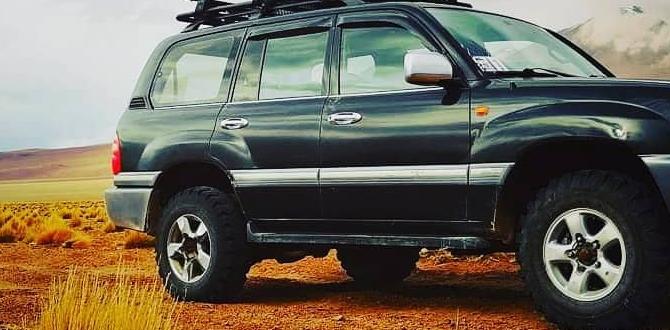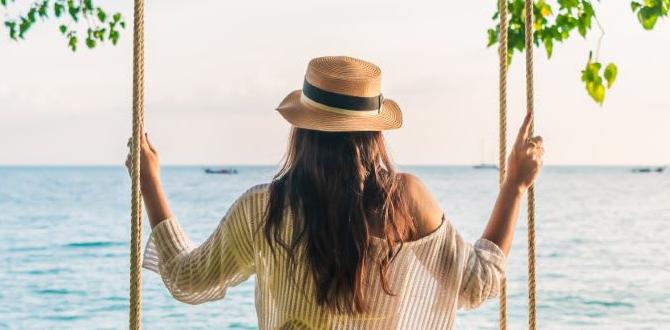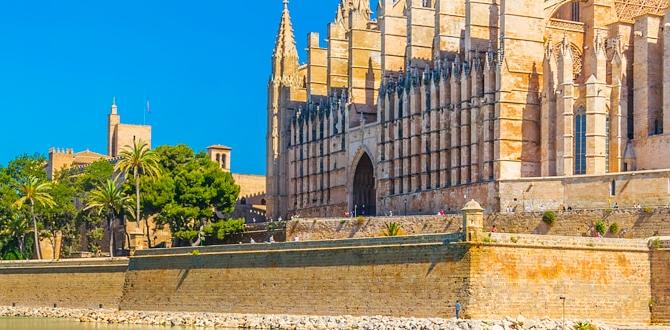Accra solo female travel is achievable and enjoyable with these insider tips. Prepare for a vibrant adventure with confidence by focusing on smart planning, safety, and immersing yourself in the local culture. This guide ensures a stress-free and memorable experience for every solo explorer in Ghana’s capital.
Accra, the bustling capital of Ghana, pulses with energy, color, and a warmth that beckons travelers from around the globe. For solo female adventurers, the thought of navigating a new city can sometimes feel a little daunting. Where do you start? How do you stay safe?
What should you absolutely not miss? Journey Essentials understands these curiosities, and we’re here to tell you that Accra is incredibly rewarding for solo female travelers when you approach it with a little preparation and a lot of enthusiasm. Forget the worries; this guide is packed with genius essential tips designed to make your solo journey through Accra not just possible, but truly unforgettable. We’ll walk you through everything from feeling secure to discovering hidden gems, ensuring your adventure is as smooth and exciting as you imagine.
Why Accra is a Fantastic Choice for Solo Female Travelers
Accra offers a unique blend of traditional charm and modern dynamism. It’s a city where ancient history meets contemporary life, creating a captivating atmosphere. The people of Ghana are renowned for their hospitality, often referred to as “Akwaaba” (welcome). This genuine warmth is a huge comfort for solo travelers, making it easier to connect with locals and feel at home. Furthermore, Accra is a hub for West African culture, art, music, and cuisine, providing endless opportunities for exploration and immersion. While like any major city, awareness is key, Accra is generally considered safe for solo female travelers who take sensible precautions. The city is a gateway to understanding the rich tapestry of Ghana, making it an ideal starting point for solo exploration on the continent.
Pre-Trip Essentials: Laying the Groundwork for Success
Before you even pack your bags, a few key steps will set you up for an incredible solo journey in Accra. Thinking ahead ensures you can focus on the adventure once you arrive.
Visa and Entry Requirements
First things first: check your visa requirements well in advance. Many nationalities need a visa to enter Ghana. The application process can take time, so don’t leave it to the last minute. You can usually apply through the Ghanaian embassy or consulate in your country. Always have a printout of your visa and passport on your person (a copy in a safe place is also wise). For detailed and official information, it’s best to consult the official Ghanaian government portal on visas.
Health and Vaccinations
Consult your doctor or a travel clinic about recommended vaccinations and malaria prophylaxis for Ghana. Yellow fever vaccination is often mandatory, and you’ll need proof of it for entry. Pack a basic first-aid kit with essentials like pain relievers, antiseptic wipes, bandages, and any personal medications. Consider carrying a small supply of hand sanitizer, as it’s always useful when on the go.
Travel Insurance: Your Safety Net
This is non-negotiable for any solo traveler. Ensure your policy covers medical emergencies, trip cancellations, lost luggage, and any adventure activities you might plan. Read the fine print carefully to understand what’s included and excluded. It provides immense peace of mind knowing you’re covered.
Currency and Budgeting
The currency in Ghana is the Ghanaian Cedi (GHS). Inform your bank of your travel dates to avoid any issues with your cards. While credit cards are accepted in larger hotels and supermarkets, cash is king for markets, taxis, and smaller vendors. ATMs are available in Accra, but it’s wise to have some US dollars or Euros to exchange upon arrival. Research the average costs for accommodation, food, and transport to set a realistic budget.
Learning Basic Phrases
While English is the official language, knowing a few basic phrases in Twi, the most widely spoken local language, will go a long way in connecting with people and showing respect. Phrases like “Akwaaba” (welcome), “Medaase” (thank you), “Paako” (please), and “Wo ho te sen?” (How are you?) will be greatly appreciated.
Safety First: Navigating Accra with Confidence
Safety is paramount for any traveler, especially when exploring solo. Accra is a vibrant city, and with a few simple precautions, you can feel secure and enjoy your time to the fullest.
Accommodation Choices
Reputable Hotels: For your first solo trip, consider staying in well-reviewed hotels in safer neighborhoods like Osu, Airport Residential Area, or East Legon. These areas are often well-lit and have a stronger presence of security.
Guesthouses and Airbnb: Look for well-reviewed guesthouses or Airbnb accommodations with good security features and positive feedback from previous solo female guests. Always check reviews specifically mentioning safety.
Location, Location, Location: Even within these neighborhoods, choose accommodations close to main roads or easily accessible by reputable transport.
Transportation Smarts
Ride-Sharing Apps: Apps like Uber and Bolt are readily available in Accra and are generally a safe and convenient option. They offer GPS tracking and fare estimates. Always verify the license plate and driver’s details match the app.
Reputable Taxi Services: Ask your hotel to call a reputable taxi company or use a taxi service recommended by trusted sources. Avoid hailing random taxis on the street, especially at night. If you do, agree on the fare before you start your journey.
Chauffeur Services: For longer distances or specific tours, consider hiring a reputable driver for the day. This can also be a great way to get local insights.
Staying Connected
Local SIM Card: Purchase a local SIM card upon arrival. This is inexpensive and allows you to easily use data for maps, ride-sharing apps, and contacting people. MTN, Vodafone, and AirtelTigo are major providers.
Inform Someone: Share your itinerary with a trusted friend or family member back home and check in regularly. Let your accommodation know your general plans if you’ll be out late.
General Safety Tips
Be Aware of Your Surroundings: This is crucial everywhere. Avoid displaying expensive jewelry or electronics unnecessarily. Keep your bag secure, zipped, and ideally in front of you, especially in crowded places.
Trust Your Instincts: If a situation feels uncomfortable or unsafe, remove yourself from it. Don’t worry about being polite; your safety comes first.
Avoid Walking Alone at Night: Stick to well-lit, busy areas if you must walk after dark, or opt for a taxi/ride-share.
Keep Valuables Secure: Use a money belt or a secure internal pocket for your passport, cash, and cards. Only carry what you need for the day.
Health & Personal Care Considerations
For some solo travelers, managing personal needs like incontinence can add an extra layer of concern. It’s reassuring to know that accessible and discreet solutions exist. Many pharmacies in Accra will stock essential personal care items that can provide comfort and dignity. If you require specific products, such as adult diapers or protective underwear, it’s worth bringing a sufficient supply from home, packed discreetly in your luggage. Alternatively, larger pharmacies or medical supply stores might carry a range of options. Researching available products and brands beforehand can give you confidence. For long-haul flights or extended excursions, ensuring you have a comfortable and reliable supply of such items is key to a stress-free travel experience. Many modern adult incontinence products are designed to be highly absorbent, discreet, and breathable, allowing you to focus on enjoying Accra’s wonders without worry.
Embracing the Accra Experience: What to See and Do
Accra is a city brimming with culture, history, and vibrant daily life. As a solo traveler, you have the freedom to explore at your own pace and discover its many facets.
Historical and Cultural Immersion
Independence Square: A significant landmark where Ghana declared independence from British rule. It’s a place for reflection and understanding the nation’s history.
Kwame Nkrumah Mausoleum: The resting place of Ghana’s first president, Kwame Nkrumah, this museum offers insights into Ghana’s struggle for independence and its post-colonial journey.
National Museum of Ghana: Explore artifacts that showcase Ghana’s rich history, art, and culture. (Note: Check for current opening status as it can be subject to renovation).
W.E.B. Du Bois Centre: A poignant site dedicated to the American civil rights leader who lived and died in Ghana.
James Town: A historic fishing community with a distinct culture, vibrant street art, and colonial architecture. It’s a fantastic area to wander and observe local life. Visit the Jamestown Lighthouse for panoramic views.
Art, Music, and Markets
Artists Alliance Gallery: Houses an impressive collection of contemporary and traditional Ghanaian art.
Kaneshi Market: An overwhelming, vibrant, and authentic market experience. Be prepared for crowds and sensory overload! It’s the perfect place to find textiles, crafts, and local produce. Remember to haggle politely.
Makola Market: Another bustling market offering everything from clothing and spices to household goods.
Osu Night Market: If you are lucky and it aligns with your visit, this market offers a fantastic evening of local food, music, and crafts – a great way to experience Accra’s nightlife.
Beaches and Relaxation
Labadi Beach: A popular beach known for its lively atmosphere, music, and food stalls. It can get busy, especially on weekends.
Bojo Beach: Located a bit further out, this is a more tranquil option offering a beautiful stretch of sand and clear waters. Access is often by boat.
Kokrobite Beach: Popular for surfers and those looking for a more laid-back vibe, often with drumming circles in the evenings.
Foodie Adventures
Accra is a paradise for food lovers. Don’t be afraid to try local dishes!
Jollof Rice: A must-try! This flavorful one-pot rice dish is a national obsession.
Fufu: A staple made from pounded cassava and plantain, usually served with a hearty soup.
Waakye: Rice and beans cooked together with sorghum leaves, giving it a distinctive color and flavor.
Banku and Tilapia: Fermented corn and cassava dough, often served with grilled tilapia and a hot pepper sauce.
Street Food: From grilled meats (kebabs) to plantain and kelewele (spicy fried plantain), explore the local flavors at designated street food stalls.
Navigating Daily Life in Accra
Understanding local customs and getting around efficiently will significantly enhance your solo travel experience.
Best Time to Visit
Accra experiences two main seasons: the dry season (November to March) and the rainy season (April to October). The dry season is generally considered the most pleasant time to visit, with cooler temperatures and less humidity. However, the shoulder months can also be excellent with fewer crowds.
What to Pack: Practicalities
Lightweight Clothing: Breathable fabrics like cotton and linen are best for the tropical climate.
Modest Attire: While Accra is relatively liberal, it’s respectful to dress modestly, especially when visiting local communities or religious sites. Long skirts, trousers, and tops covering your shoulders are advisable.
Rain Gear: A lightweight rain jacket or umbrella is essential, particularly during the rainy season.
Comfortable Walking Shoes: You’ll be doing a lot of exploring!
Sun Protection: Sunscreen, a wide-brimmed hat, and sunglasses.
Insect Repellent: Especially for evenings and if you plan to visit greener areas.
Power Adapter: Ghana uses Type G plugs (the same as the UK). The voltage is 230V.
Etiquette and Customs
Greetings: A warm greeting is always appreciated.
Patience: Things may not always move at the pace you’re used to. Embrace the relaxed pace and practice patience.
* Photography: Always ask for permission before taking photos of people, especially in markets or rural areas.
Solo Female Traveler Quick Tips Table
Here’s a handy table summarizing key tips for your Accra solo adventure:
| Area | Key Tip | Why It Matters |
|---|---|---|
| Safety | Use ride-sharing apps and reputable taxis. | Ensures reliable and traceable transport. |
| Connectivity | Get a local SIM card. | Essential for navigation, communication, and emergencies. |
| Culture | Learn basic Twi phrases. | Builds rapport and shows respect. |
| Exploration | Visit markets during daylight. | Better visibility and easier navigation. |
| Finance | Carry some cash, but use ATMs wisely. | Cash is for daily expenses; ATMs in reputable banks are safer than street exchanges. |
| Well-being | Stay hydrated and use insect repellent. | Essential for comfort and health in a tropical climate. |
| Accommodation | Read recent reviews for solo travelers. | Gauges current safety and comfort levels. |
Packing List for Comfort and Practicality
Beyond the general items, consider these for added comfort and ease:
- Reusable Water Bottle: Stay hydrated, and reduce plastic waste. You can often refill at your hotel or purchase large water jugs to refill from.
- Travel-Sized Toiletries: Along with your regular items, consider quick-dry towels or any specific personal care needs. If you require adult diapers or other incontinence products, packing a discreet supply is recommended, ensuring comfort and dignity throughout your travels. Modern options are lightweight and highly absorbent, offering peace of mind for long days or journeys.
- Portable Power Bank: Essential for keeping your phone charged on the go, especially if you’re using navigation or ride-sharing apps extensively.





